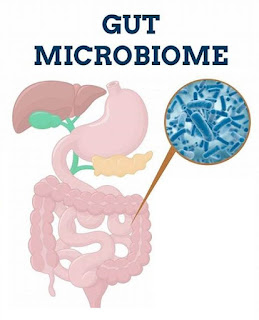The Role of Gut
Microbiota in Weight Management
The burgeoning
field of microbiome research has revealed that our gut bacteria play a crucial
role in a variety of bodily functions, including digestion, immune response,
and, more intriguingly, weight management. The relationship between gut
microbiota and obesity is an area of significant interest as it has profound
implications for both preventive and therapeutic measures against this global
epidemic. Understanding how different gut bacteria influence metabolism and fat
storage opens the door to innovative strategies for weight management and
obesity treatment.
The human gastrointestinal tract is home to trillions of microorganisms, collectively referred to as the gut microbiota. These microorganisms include bacteria, archaea, viruses, and fungi. The composition of the gut microbiota is influenced by numerous factors, including diet, age, genetics, and environmental exposures. This assemblage of microbes plays a pivotal role in digesting food, synthesizing essential nutrients, and modulating the immune system. However, emerging evidence suggests that gut microbiota also significantly influence host metabolism, particularly in relation to energy balance and fat storage.
The Interplay between Gut Bacteria and Metabolism
The gut microbiota impacts metabolism through several mechanisms, including the fermentation of dietary fibers and the production of short-chain fatty acids (SCFAs). SCFAs, such as acetate, propionate, and butyrate, are produced when gut bacteria ferment undigested carbohydrates. These SCFAs serve as energy sources for colon cells and have been linked to numerous health benefits, including improved insulin sensitivity and reduced inflammation.
Research has shown that individuals with obesity often exhibit a distinct microbial composition compared to their lean counterparts. For instance, studies have indicated an increase in the Firmicutes phylum and a decrease in the Bacteroidetes phylum in the guts of obese individuals. This shift in microbial diversity can lead to enhanced energy extraction from food, contributing to weight gain. For instance, an experiment conducted by Turnbaugh et al. (2006) highlighted that germ-free mice colonized with microbiota from obese mice gained more fat than those colonized with microbiota from lean individuals, suggesting a clear influence of gut bacteria on metabolism.
Gut Microbiota and Fat Storage
The ability of gut bacteria to influence fat storage is largely attributable to their role in modulating hormonal responses and inflammatory pathways. Microbiota composition can affect the production of hormones such as ghrelin, which stimulates appetite, and leptin, which signals satiety. An imbalanced gut microbiome may result in increased ghrelin levels and decreased leptin levels, causing enhanced appetite and reduced energy expenditure.
Moreover, the gut microbiota influences inflammatory markers in the body. Chronic low-grade inflammation, often observed in obesity, is associated with an altered gut microbiome. Certain gut bacteria produce pro-inflammatory compounds that can trigger metabolic disorders, thereby further complicating weight management. Conversely, beneficial gut bacteria can help reduce inflammation and promote a healthier metabolic profile.
Recognizing the significance of gut microbiota in weight management emphasizes the potential for microbiome-based interventions in obesity treatment. Here are some unique tips and secrets derived from current research trends:
1. Dietary Modifications: A diet rich in fiber helps promote the growth of beneficial gut bacteria. Whole foods such as fruits, vegetables, whole grains, and legumes can enhance microbial diversity and support healthy weight management. Conversely, a diet high in sugar and saturated fats may promote the growth of harmful bacteria, leading to weight gain.
2. Probiotics and Prebiotics: Incorporating probiotics (live beneficial bacteria) and prebiotics (compounds that feed good bacteria) into the diet may help improve gut health and metabolic functions. Probiotics such as Lactobacillus and Bifidobacterium have been shown to aid in weight loss and fat reduction in various studies.
3. Personalized Nutrition: The composition of an individual’s gut microbiome can vary significantly, meaning that weight management strategies should be personalized. Advances in microbiome profiling technologies allow for more tailored dietary recommendations based on one’s unique gut flora composition.
4. Antibiotic Awareness: The use of antibiotics can profoundly affect gut microbiota and may contribute to weight gain. Responsible antibiotic use and considering alternatives when feasible can preserve the diversity and health of gut bacteria.
5. Regular Physical Activity: Engaging in regular exercise not only aids weight management but also positively influences gut microbiota diversity and composition. Studies have shown that physically active individuals tend to have more diverse microbiomes compared to sedentary individuals.
6. Mindfulness and Stress Management: Psychological stress can negatively affect gut health, lead to poor dietary choices, and promote weight gain. Practicing mindfulness through activities such as meditation, yoga, or other stress-reducing techniques can positively impact both gut health and weight management.
The intricate relationship between gut microbiota, metabolism, and weight management underscores the importance of a holistic approach to obesity prevention and treatment. As research continues to uncover the complexities of gut microbiota and its influence on energy balance and fat storage, it is crucial to consider these insights in developing effective strategies for weight management. By integrating dietary modifications, mindful lifestyle choices, and an understanding of one’s unique microbiome, individuals may harness the power of gut bacteria in their journey toward achieving a healthier weight. In doing so, we not only pave the way for effective obesity interventions but also advance our understanding of holistic health and well-being.

.jfif)
.jfif)
No comments:
Post a Comment